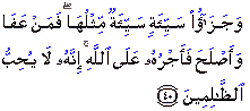Retributions, Gentleness, Interference, Light the Candle, Oppose the War
Issue 214 » March 21, 2003 - Muharram 18, 1424
General
Al-Shura
(Counsel)
Commentary: While Islamic Shariah
(law) is under fire in the media and among academics for inflicting 'cruel
punishments', it is important not to lose sight some noble principles
set by the Quran that regulate the punishment and reform of criminals
in the society. The images of flogging and beheading,
often taken out of context and exaggerated, have greatly enhanced
misconceptions surrounding the Islamic justice system.
Shariah & Protection of
Human Rights
Since Islamic places immense emphasis on fulfilling
social obligations, it only punishes those
crimes that violate the human rights. One of the golden principles of
penal law in Islam is the right of Retribution (Qisas). When
a person causes physical harm to a fellow human being, Islam gives the
injured party the right of equal requital. This
procedure is persistently labelled by critics as primitive and uncivilized.
In the Islamic view of history, however, what is primitive has never been
necessarily uncivilized, because human nature, inclinations, and divine
guidance have always remained the same.
Retribution: Its Purpose
Khurram Murad in his book Shariah:
The Way of Justice explains: In
the eyes of the Quran, the right of retribution belongs to individuals,
and not to society or state; this simple shift in responsibility
results in a profound change in the whole system of implementing justice.
Instead of starting an irreversible process of trial and punishment (involving
so much time, financial support, and efforts for years), Islamic
law initially leaves the ground open for settlement between individuals,
without the interference by impersonal bureaucratic machinery,
though under no circumstance can the individual take the law into his
or her own hands.
Two Conditions:
1- If the victim/injured chooses to demand compensation,
it has to be equal to the loss incurred, and could never be more.
This concept is quite contrary to our own judicial system in the West,
where millions of dollars are often claimed by the victim in law
suites for relatively small injuries or injustices.
2- Islamic law prefers
that victim forgives the criminal. Thus under
Qisas, punishment is avoidable, because "whoever
forgives and amends, his reward is due from Allah..." The ideal
way is not to seek vengeance at all, but reconciliation and make
offender realize the gravity of his or her offence.
It is also important to note, as Abdur-Rahman
Doi in Shariah: The Islamic Law points out, the
Quran generally adopts the same word for the punishment
(retribution) as for the original crime. Thus in the
above quoted verse, both the crime and punishment are called Sayyiah
(evil); in chapter 2:194, the word used is I'tida
(aggression). The use of the same word for both crime
and punishment indicates that punishment itself, though justified
by the circumstances, is truly speaking nothing but a necessary evil. |
||
Allah Loves Gentleness "Indeed
Allah is gentle and loves gentleness, and gives due to gentleness that
which He does not give due to harshness." From Allah's beautiful and excellent Names is the Ever-Discreetly Gentle (al-Lateef). He is the One Who is so Discreet in His Actions that He discerns the hidden and secret, and what the hearts are filled with. He is Ever-Gentle with His devoted slaves and makes things easy for them and keeps them away from difficulties. He makes the path to His Pleasure and Generosity easy for them. He is Gentle with them with respect to their own souls as He guides them to His beautiful ways and His noble creations. He is Gentle with them with respect to matters that are external to them with every goodness and righteousness. The Muslim who truly understands the teachings of his religion is gentle, friendly and likeable. He mixes with people and gets along with them. This is something which should be a characteristic of the Muslim who understands that keeping in touch with people and earning their trust is one of the most important duties of the Muslim. It is an effective means of conveying the message of truth to them, and exposing them to its moral values, because people only listen to those whom they like, trust and accept. [compiled from www.Islaam.com] |
||
This will be a series based on the book "Building a New Society" Interference With Natural Processes Materialism has embedded passivity, greed and selfishness in social attitudes and practices. To satisfy our greed, we are corrupting and polluting the air, water and fruits and vegetables, which are essential for human survival. In order to make big profits quickly, domestic animals are injected with chemical hormones and given feed that is not natural to their bodily systems in order to speed up and boost their growth. Foods, contaminated with all kinds of chemicals and preservatives, are changing the chemistry of our bodies; making some of us more temperamental, or less sensitive to social wrongs. Society is even using genetic engineering for cloning. What this will lead to, only Allah knows. [Compiled from "Building a New Society", by Zahid Parvez, pp. 82, 83] |
||
Light the Candle "It is indeed high
time for our rulers to realize that there can neither be stability in
their societies nor hope for their peoples except through real commitment
and adherence to Islam. Umar bin al Khattab (may Allah be pleased with
him) said: 'We had been the lowest of nations, but Allah honoured
us with Islam. Should we try to attain honour through means other than
Islam, Allah will debase us.' Furthermore, unless Shari'ah is
applied, our societies will continue to breed extremists, religious or
otherwise." - Yusuf Al-Qaradawi [Taken from "Islamic Awakening Between Rejection and Extremism", by Yusuf Al-Qaradawi] |
